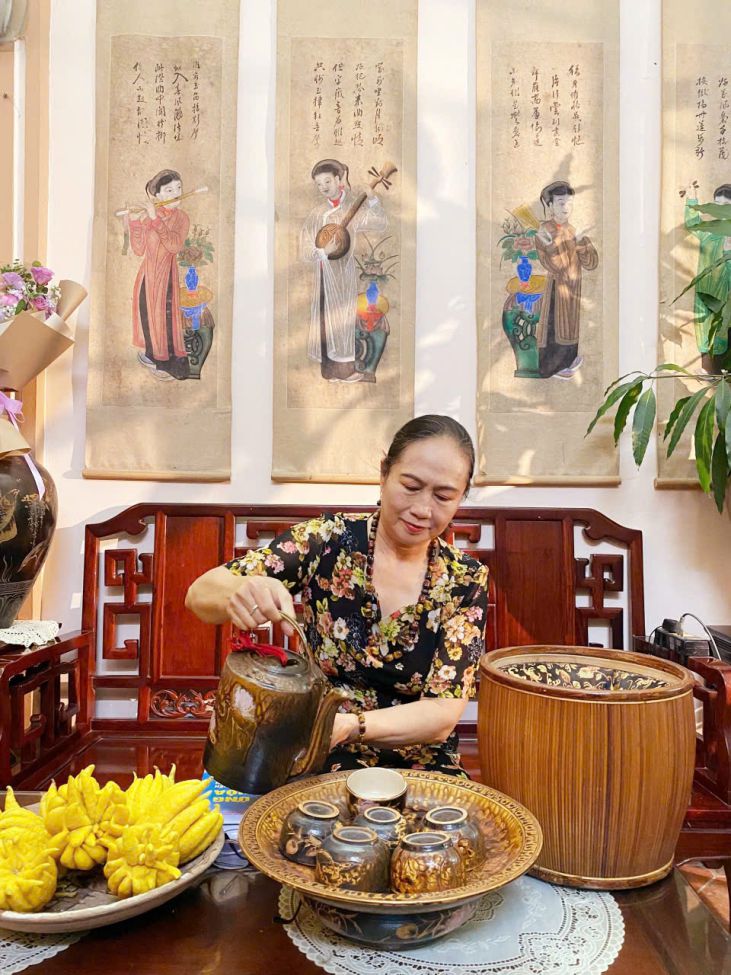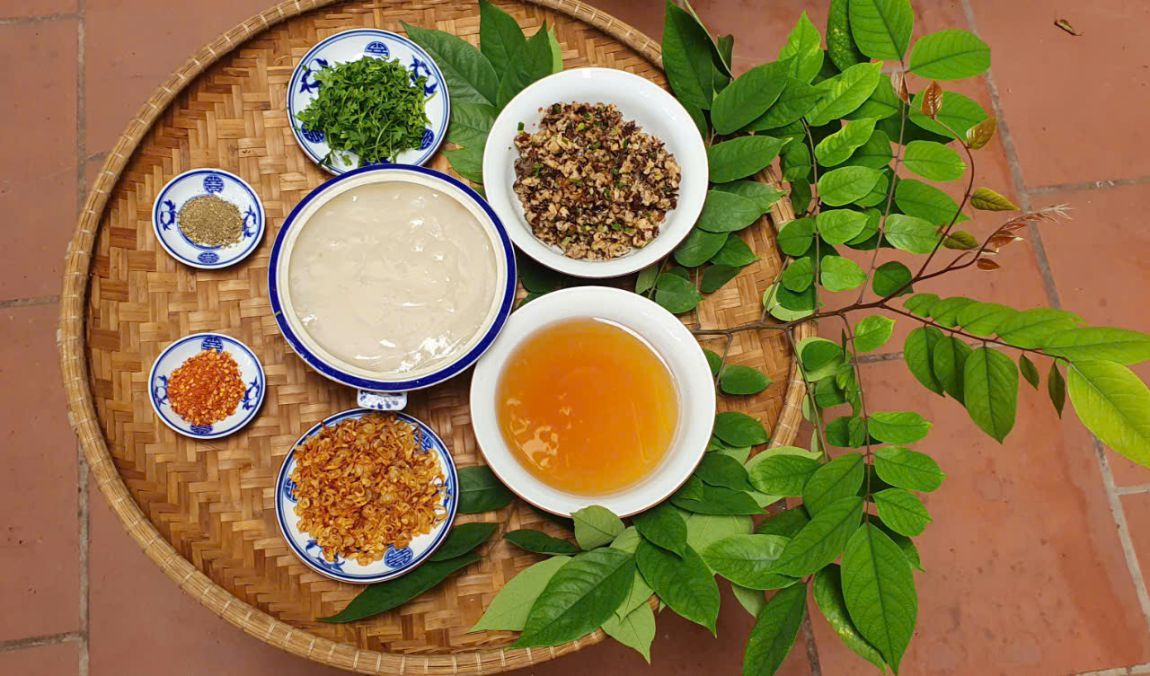To understand the "elegance" of Hanoi people, Lao Dong Newspaper had a conversation with journalist Vu Thi Tuyet Nhung - former Head of the Social and Cultural Department of Hanoi Television - a Hanoi woman who loves Hanoi very much and is trying to preserve the traditional beauty of Hanoi.
START WITH WORDS...
Dear Tuyet Nhung, we often say “elegant like a Hanoian” when referring to the character of Hanoians. So how can we understand this word “elegant”?
- Honestly, my ancestral roots are Ung Hoa (Ha Tay, now Hanoi), but both my paternal and maternal sides have lived in Hanoi for 4-5 generations. But even so, I still don't understand the concept of "elegance" that you put in your question.
In my personal observation, it seems that Hanoians do not consider themselves to have the quality of “elegance”, nor do I see our grandparents or parents teaching us how to behave “elegantly”. It seems that “elegance” is a value that outsiders assign to Hanoians, or that is their opinion of Hanoians when they see how Hanoians behave.
I also know the verse "Even if not elegant, still a person from Trang An", because this is a verse written by Nguyen Cong Tru in a ca tru song titled "Thanh Thang Long", and Nguyen Cong Tru was born in Thai Binh, in his official career he only passed through Thang Long as a place of wandering.
This makes me believe that, no matter what, Hanoians would never say that they are “elegant” so casually. However, in every word, speech, dress, and behavior, Hanoians always keep within the framework of the word “Thanh” which means clean, pure, keeping themselves from being tainted in mind - body - speech - mind, in both appearance and reputation; and “Lich” which means polite, courteous, traditional, with family traditions - national etiquette.

It seems that the category of "elegance" of Hanoi people is broad and complicated, right?
- I think that a code of conduct for society is never something simple and can be achieved in a day or two. It must be the result of a summary and passed down through many generations in a community, for example the community of "Hanoi people". And no matter how large it is, that code of conduct must start from "Words", from the words and speech, from what people use to communicate with each other every day.
Hanoians do not teach each other to “speak elegantly” but they know how to speak in a way that makes everyone feel happy and harmonious. For example, when it comes to compliments and criticisms, we will never see Hanoians complimenting and criticizing each other directly, or speaking directly to each other’s faces, which can easily cause misunderstandings and resentment.
Instead, words are carefully chosen, so that praise is not obvious, criticism is not rude, the meaning is both profound and gentle. The voice is also gentle, peaceful, and light, not high, not shrill, not loud, not harsh. Therefore, raising one's voice and arguing are absolutely to be avoided.
When my mother took me to the market, she taught me how to bargain for goods, but also taught me how to bargain gently, not to haggle or argue. That habit has been deeply ingrained in my market habits. When I go to the market, I bargain, but I consider it a way of communication between buyers and sellers to create a happy atmosphere rather than to profit.
...THENDER OF BEHAVIOR
What comes after the words, ma'am?
- I think it is the way people behave in life. Usually, the way of behaving reflects a person's ability to communicate socially and their level of education and awareness. The way Hanoians dress is the most honest business card for them to introduce themselves to everyone.
If your words are gentle and create a good impression, then polite and sincere behavior will further enhance that impression. When going out or communicating, your clothes must be neat, the colors should not be too bright but should be elegant, gentle, neutral or dark.
This reflects the true character of Hanoians, who always avoid making themselves stand out too much, and especially their clothes must be worthy of their virtue. More than ten years ago, I met an old lady who owned a wardrobe of all kinds of ao dai. She said that each ao dai is worn on different occasions, but must be appropriate to the context.
For example, on your child’s wedding day, your ao dai should not have a more outstanding style or color than your daughter’s or daughter-in-law’s ao dai. When you attend a wedding, your ao dai should not be more outstanding than the ao dai of your mother-in-law or the bride’s mother. She only said that, but I understood that it was the “Thanh” element in the word “thanh lich”.
It is not only “frugal” so that you do not stand out too much, but also very delicate, skillful and knows how to honor those who need honoring in a subtle way. Therefore, “elegance” in the way Hanoians dress is also a very sincere and natural modesty. It creates a Hanoian character that is not easy to learn.
Where does that custom of Hanoi people come from, madam?
- In my humble opinion, I think that all the foundations that create the character of Hanoi people and the way of behaving of Hanoi people come from all over. Since 1010, Hanoi has become the capital of Vietnam, which means that the four towns of South - North - East - West converge.
This concentration not only gathers the cultural beauty of the regions in Hanoi, but also turns Hanoi into a place where people's cultural behaviors are performed. After a long process of formation, assimilation, and overlapping of cultural layers, we have what is called the spiritual cultural foundation and behavioral culture of Hanoi people.
That is why Nguyen Cong Tru, when encountering that cultural foundation, admired and wrote: "Even if it is not fragrant, it is still jasmine/ Even if it is not elegant, it is still a person from Trang An". That admiration is both objective and accurate, and gradually became a reliable confirmation of the character of our Hanoi people.
WORK - BEAUTY - SPEECH - CONDUCT CREATE ELEGANCE
Can the elegance of Trang An - Hanoi be specifically quantified, ma'am?
- Honestly, I think it is not necessary and should not be done because the elegance of Hanoians is an invisible value. I have said above that, although my family has lived in Hanoi for many generations, I have not seen the elders teach their children how to become elegant according to the standards of Trang An or Hanoi.
This may exist in families of noble families or aristocrats, but it is very rare. The rest, for example my family, teach implicitly, self-study all manners so that when they go out into the world, when they build their own family, they will not be laughed at. However, it is this spirit of self-study that has helped Hanoi's elegant cultural foundation to be solid and continuous.
When I was a child, I remember my family's dinner table was arranged like this: delicious, soft dishes were placed where my grandparents sat, in front of my father there was always a plate of snacks, my daughter always sat next to the rice pot to take care of the dishes, when there were guests, my siblings would tell each other to eat less. So when I had my own family, I just copied the original with additions to suit the situation.
Or from being taught by my father not to use chopsticks to pick up food from the plate and then eat it like "rowing a boat", but to pick it up and put it in the bowl first; after pouring soup, the ladle must be turned upside down, not upside down; when dipping in fish sauce, one must be gentle and careful, avoiding splashing the fish sauce on the tray; when eating, one must chew slowly, without making any noise, so that I have never been laughed at at any meal after that, even without my father's supervision.

You seem to be satisfied with your parents' teachings on eating?
- That's right! Because eating habits are the first habits we have to learn in behavioral culture. Only then can we "learn to eat, learn to speak, learn to wrap, learn to open". I also realize that eating behaviors are the most effective way to train social behavioral skills.
In addition to dressing, speaking, and behaving properly, there seems to be another factor that people praise the “elegance” of Hanoians through their meals and banquets. Beauty, ingenuity, sophistication, carefulness, meticulousness, and efficiency are all expressed here. Do you think so?
You mean the role of Cong - Dung - Ngon - Hanh in creating elegance, right?
- That's right, because Hanoi is the capital, the capital, the center of communication. Therefore, banquets and feasts are also an important part of that culture. Preparing a beautiful, luxurious and elegant meal to entertain guests, a happy party or a state banquet is the way Hanoians behave elegantly with their guests.
This is truly a unique look at the elegance of Hanoians. Thank you so much for this interesting conversation!
Journalist Vu Thi Tuyet Nhung Date of birth: September 23, 1957 Position before retirement: Head of the Social and Cultural Department of Hanoi Television. Published works about Hanoi: + Hanoi's ancient fragrance and taste (2 volumes). + Specialties from all over the world. + Beloved Hanoi.











